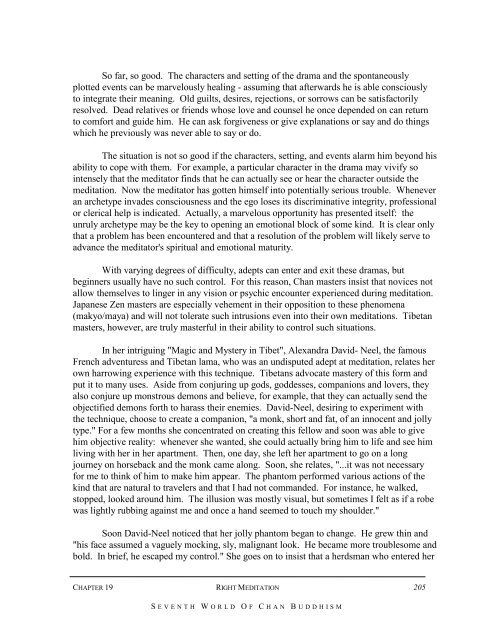seventh world of chan buddhism - Zen Buddhist Order of Hsu Yun
seventh world of chan buddhism - Zen Buddhist Order of Hsu Yun
seventh world of chan buddhism - Zen Buddhist Order of Hsu Yun
Create successful ePaper yourself
Turn your PDF publications into a flip-book with our unique Google optimized e-Paper software.
So far, so good. The characters and setting <strong>of</strong> the drama and the spontaneously<br />
plotted events can be marvelously healing - assuming that afterwards he is able consciously<br />
to integrate their meaning. Old guilts, desires, rejections, or sorrows can be satisfactorily<br />
resolved. Dead relatives or friends whose love and counsel he once depended on can return<br />
to comfort and guide him. He can ask forgiveness or give explanations or say and do things<br />
which he previously was never able to say or do.<br />
The situation is not so good if the characters, setting, and events alarm him beyond his<br />
ability to cope with them. For example, a particular character in the drama may vivify so<br />
intensely that the meditator finds that he can actually see or hear the character outside the<br />
meditation. Now the meditator has gotten himself into potentially serious trouble. Whenever<br />
an archetype invades consciousness and the ego loses its discriminative integrity, pr<strong>of</strong>essional<br />
or clerical help is indicated. Actually, a marvelous opportunity has presented itself: the<br />
unruly archetype may be the key to opening an emotional block <strong>of</strong> some kind. It is clear only<br />
that a problem has been encountered and that a resolution <strong>of</strong> the problem will likely serve to<br />
advance the meditator's spiritual and emotional maturity.<br />
With varying degrees <strong>of</strong> difficulty, adepts can enter and exit these dramas, but<br />
beginners usually have no such control. For this reason, Chan masters insist that novices not<br />
allow themselves to linger in any vision or psychic encounter experienced during meditation.<br />
Japanese <strong>Zen</strong> masters are especially vehement in their opposition to these phenomena<br />
(makyo/maya) and will not tolerate such intrusions even into their own meditations. Tibetan<br />
masters, however, are truly masterful in their ability to control such situations.<br />
In her intriguing "Magic and Mystery in Tibet", Alexandra David- Neel, the famous<br />
French adventuress and Tibetan lama, who was an undisputed adept at meditation, relates her<br />
own harrowing experience with this technique. Tibetans advocate mastery <strong>of</strong> this form and<br />
put it to many uses. Aside from conjuring up gods, goddesses, companions and lovers, they<br />
also conjure up monstrous demons and believe, for example, that they can actually send the<br />
objectified demons forth to harass their enemies. David-Neel, desiring to experiment with<br />
the technique, choose to create a companion, "a monk, short and fat, <strong>of</strong> an innocent and jolly<br />
type." For a few months she concentrated on creating this fellow and soon was able to give<br />
him objective reality: whenever she wanted, she could actually bring him to life and see him<br />
living with her in her apartment. Then, one day, she left her apartment to go on a long<br />
journey on horseback and the monk came along. Soon, she relates, "...it was not necessary<br />
for me to think <strong>of</strong> him to make him appear. The phantom performed various actions <strong>of</strong> the<br />
kind that are natural to travelers and that I had not commanded. For instance, he walked,<br />
stopped, looked around him. The illusion was mostly visual, but sometimes I felt as if a robe<br />
was lightly rubbing against me and once a hand seemed to touch my shoulder."<br />
Soon David-Neel noticed that her jolly phantom began to <strong>chan</strong>ge. He grew thin and<br />
"his face assumed a vaguely mocking, sly, malignant look. He became more troublesome and<br />
bold. In brief, he escaped my control." She goes on to insist that a herdsman who entered her<br />
CHAPTER 19 RIGHT MEDITATION<br />
S EVENTH W ORLD O F C HAN B UDDHISM<br />
205


